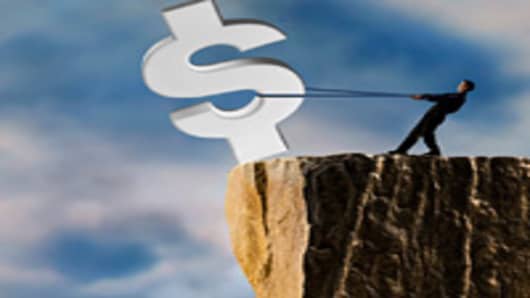As markets continue to wait with bated breath over the outcome of "fiscal cliff" talks, one fund manager said, the worst case scenario may not be so bad.
According to Mike Crofton, president and CEO of Philadelphia Trust Company, stock markets will most certainly tumble if the United States goes over the 'cliff,' and that could present a great opportunity for investors to scoop up stocks.
"If we went off the fiscal cliff, the market would respond in a very negative way and maybe lose about 8 percent. I would use that as an opportunity to buy stocks because going over the fiscal cliff creates a crisis and we always solve crises," Crofton told CNBC Asia's "Squawk Box" on Friday.
He added: "I think that would be the best solution longer term. This posturing and postponing and give-and-take are just going to prolong the agony and make it a lot worse over the long run. I would welcome going over the fiscal cliff because I can get fully invested."
The U.S. Congress continues to be locked in talks about how to avert the "fiscal cliff" – a conundrum the economy will face in on January 1, when tax hikes and spending cuts worth $500 billion will kick in. It is widely feared that a tumble down this cliff will throw the U.S. back into recession.
Thursday's negotiations appeared to show little progress toward a deal, with markets dipping briefly into negative territory in Thursday trade after House of Representatives Speaker John Boehner said on Thursday that talks with the White House had made "no substantive progress."
(Read more: Obama's 'Fiscal Cliff' Proposal: $1.6 Trillion in Tax Increases)
The indices however rebounded in late trade, with the Nasdaq Composite Index and S&P 500 both closing higher.
But Crofton warns against dipping into markets before there's clarity on the "fiscal cliff".
"It's mindboggling to me. I think today's market action was very curious. Today (Thursday), we learnt that they are really no closer to compromising now than they were before the (presidential) election," he said.
"I'm not sure what's behind it but it's not something I think we should participate in. I think we should stay out of the markets here," he added.
(Read more: Expect 'Fiscal Cliff' Sell-Off on Friday: Adami)
Is Ignorance About Fiscal Cliff Propping Up Spending?
Meanwhile, analysts point to worrying signs in consumers' behavior, which suggest most Americans aren't clear about the potential fallout of a "fiscal cliff" eventuality on their pockets.
The latest Conference Board report showed consumer confidence rose to a four-and-a-half-year high in November as consumers became more optimistic about the outlook for the economy.
The report seemed to contradict the latest growth data out of the the U.S., which showed consumer and business spending revised lower, even as the economy grew faster than initially projected rate of 2.7 percent in the third quarter, as restocking by businesses provided a boost.
Tom Porcelli, chief U.S. economist with RBC Capital Markets in New York, told CNBC the mixed signals in consumer behavior showed that most Americans still do not know the impact of the "fiscal cliff" on their salaries next year. The firm conducted a survey and found that 60 percent have no inkling what the tax hikes and spending cuts in January would do, he added.
"This is the great dislocation taking place in the data right now," Porcelli said. "And the one thing that we have to sort of consider is that perhaps ignorance is bliss…I think if they did understand, confidence numbers might not be rising as much as they have over the last month or two."
(Read more: Do Americans Care About the 'Fiscal Cliff'?)
The fact is, the economy continues to be weak and will remain so for the rest of the year, said Sam Chandan, president and chief economist of Chandan Economics, President & Chief Economist in Philadelphia. Much of this can be blamed on Congress' failure to reach a deal, he added.
"I think there's an extraordinary game of brinksmanship being played and unfortunately, that's exerting a drag on the economy. That's part of why we don't see the economy growing at its potential rate," he told CNBC Asia's "Squawk Box" on Friday. "We don't see investment, we don't see hiring where it could be."
Alastair Newton, senior political analyst with Nomura, however is confident that a disaster could be averted.
"I'm going to stick my neck out. I think there's a 70 percent probability we get a dealbefore the end of the year and when I come back next year, you can tell me I've got it wrong," he said.
—Written by CNBC's Jean Chua.


